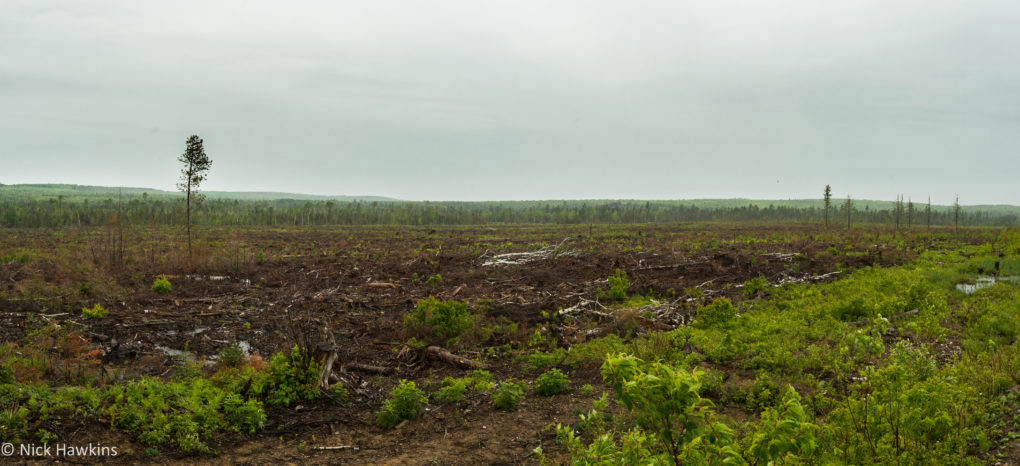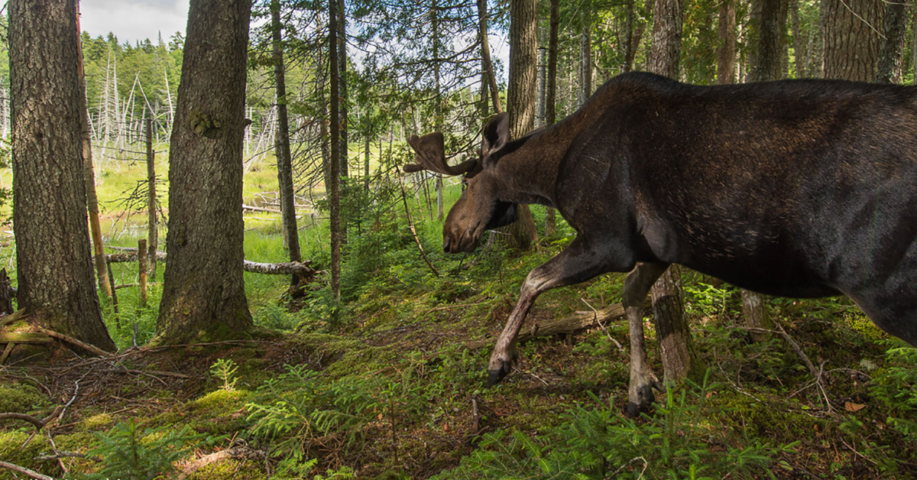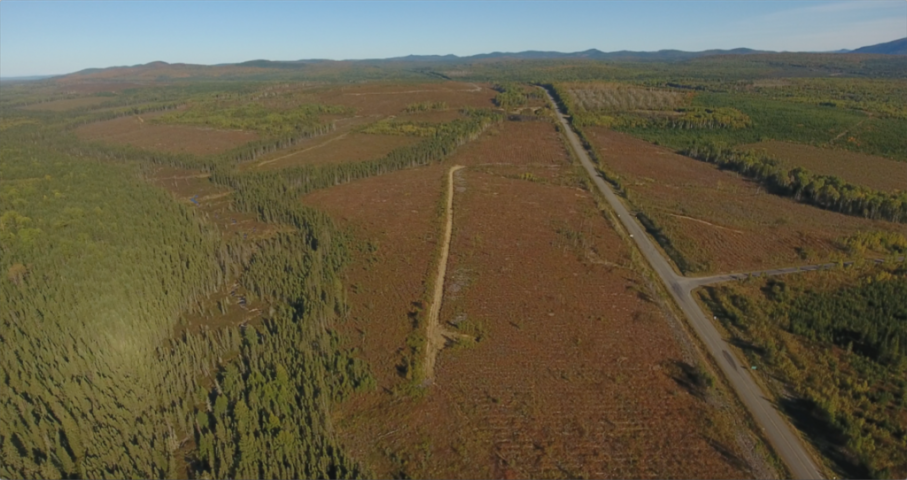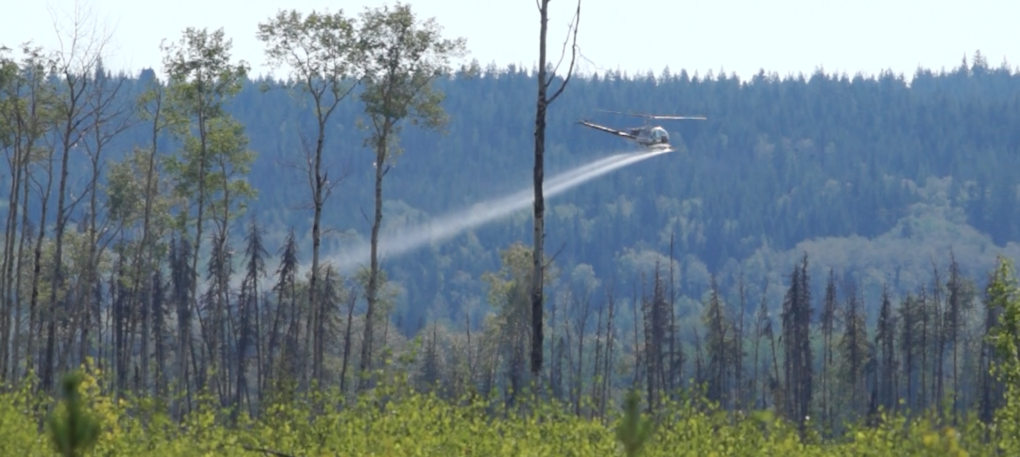As New Brunswick’s Standing Committee on Climate Change and the Environment prepares for its meetings in June on the use of glyphosate in the Crown forest, a bill to ban aerial spraying of the chemical in Maine’s woods has bi-partisan sponsorship in our southern neighbour’s Legislature.
The bill, L.D. 125, will prohibit aerial spraying of glyphosate-based herbicides often used in combination with clear-cutting by forestry companies, including New Brunswick-based J.D. Irving.
Proposed by Democratic Senator Troy Jackson (Aroostook) and co-sponsored by Republican Senator Rick Bennett (Oxford), the measure has also gained support from dozens of environmental advocates, the organic farming community, and fishing guides and other citizens who make their living from Maine’s woods.

“I’ve seen the effects of the toxic spraying firsthand,” Hilton Hafford, a registered Maine Guide and retired logger told the committee studying the bill earlier this month. “It’s affecting our rivers, our brooks, our streams, our wildlife, and that habitat for our wildlife.
“At some point we have to ask ourselves, are we going to sacrifice our wildlife and our environment for the bottom line of one industry?”
The committee is charged with recommending whether to send the bill to the full Legislature for consideration later this year.
Maine’s forestry industry association, including J.D. Irving Ltd., is opposed to the bill. Irving is one of Maine’s largest landowners, with more than 1.2 million acres.
Here in New Brunswick, J.D. Irving sprays significantly more glyphosate on forests than any other company. Between 2005 and 2020, Irving sprayed more than 85,000 hectares with glyphosate-based herbicides, according to data from the Department of Natural Resources and Energy Development.
In June, the province’s Standing Committee on Climate Change and the Environment will hold meetings during which the use of glyphosate-based herbicides in the Crown forest will be examined.
We will follow the hearings closely and bring you updates in this space, or click here to sign up for news.
The hearings come in the wake of the 2020 provincial election where all parties except one—the governing Progressive Conservatives under Premier Blaine Higgs—pledged to end spraying in the Crown forest.
Table below: Who is spraying New Brunswick forests with glyphosate: 2005-2020
| Year | J.D. Irving Ltd. | Twin Rivers Paper Company | Fornebu Lumber Company | AV Cell Inc. | A.V. Nackawic Inc | Kent License Management Team | Total Sprayed (ha) |
|---|---|---|---|---|---|---|---|
| 2005 | 4801 | 3065 | 2141 | 2266 | 376 | 0 | 12649 |
| 2006 | 4084 | 3379 | 2820 | 2377 | 1542 | 60 | 14262 |
| 2007 | 4758 | 2853 | 2875 | 2628 | 639 | 57 | 13809 |
| 2008 | 4474 | 3350 | 2244 | 1829 | 411 | 30 | 12338 |
| 2009 | 4290 | 3408 | 2305 | 1390 | 370 | 0 | 11762 |
| 2010 | 4457 | 2808 | 2847 | 1802 | 447 | 88 | 12449 |
| 2011 | 4828 | 2863 | 2555 | 3038 | 526 | 11 | 13821 |
| 2012 | 4680 | 3174 | 2203 | 3972 | 505 | 57 | 14592 |
| 2013 | 4883 | 2954 | 2060 | 3685 | 638 | 0 | 14221 |
| 2014 | 6314 | 2902 | 3210 | 2441 | 522 | 87 | 15475 |
| 2015 | 6663 | 3019 | 3348 | 2385 | 664 | 53 | 16131 |
| 2016 | 6546 | 2677 | 3451 | 2150 | 432 | 110 | 15366 |
| 2017 | 6327 | 3361 | 3557 | 1994 | 541 | 62 | 15843 |
| 2018 | 5669 | 3011 | 2981 | 2295 | 835 | 59 | 14851 |
| 2019 | 5679 | 2772 | 3951 | 2055 | 929 | 69 | 15455 |
| 2020 | 6800 | 3060 | 3186 | 1827 | 655 | 50 | 15578 |
| Company Total (ha) | 85253 | 48656 | 45734 | 38134 | 10032 | 793 | 228602 |
Source: New Brunswick Department of Natural Resources and Energy Development
What’s the problem with spraying herbicides containing glyphosate?

Forestry companies spray clearcut areas with herbicides to kill hardwoods and vegetation that compete with the spruce, fir and pine they grow in plantations.
The Conservation Council has long advocated that the province stop the old-fashioned, taxpayer-funded practice of spraying the forest. Quebec banned the spraying of its public forest 20 years ago. Glyphosate, the main active ingredient in most herbicides used in Crown forest operations in New Brunswick, was listed as a probable carcinogen by the World Health Organization’s cancer research agency, the International Agency for Research on Cancer (IARC), in 2015. Click here to learn more about glyphosate and its health impacts on people and wildlife.
The chemical is a key ingredient in the popular weed-killing product Roundup/Vision, developed by the agricultural giant Monsanto. In June 2020, Monsanto’s new owner, Bayer, said it would pay $10.9 billion to settle claims Roundup had caused cancer in some users. The company continues to maintain the product is safe.

Conservationists, biologists and hunters are worried that spraying vegetation is wiping out the food and habitats of our forest wildlife. The concern among New Brunswickers is so widespread more than 35,000 people have signed a petition to end the old-fashioned practice, organized by Stop Spraying New Brunswick. Since 2017, more than 5,000 New Brunswickers have used the Conservation Council’s letter-writing tool to call on their MLA and the provincial government to ban the spraying our forest with herbicides.
Want this unnecessary and old fashioned practice to stop? Write your MLA!
Use our letter-writing tool to tell your MLA, the provincial government, and all party leaders to ban the spraying of our forest. Our pre-written letter will get you started, but we encourage you to add your comments on spraying and large-scale clearcutting and how it has affected you.
Recommended links:
- Then and now: What the Auditor General says about forest management in N.B.
- Wildlife, forestry and conservation groups join with scientists and academics to call for new Crown Lands and Forests Act
- CCNB statement in response to report released by the Office of the Chief Medical Officer of Health on glyphosate
- The way we manage our forest is outdated: experts
- Canada’s pesticide regulator “captured by industry”

